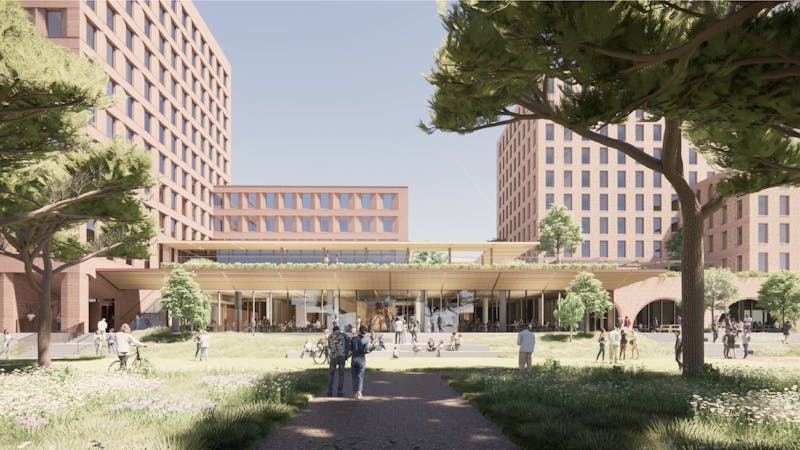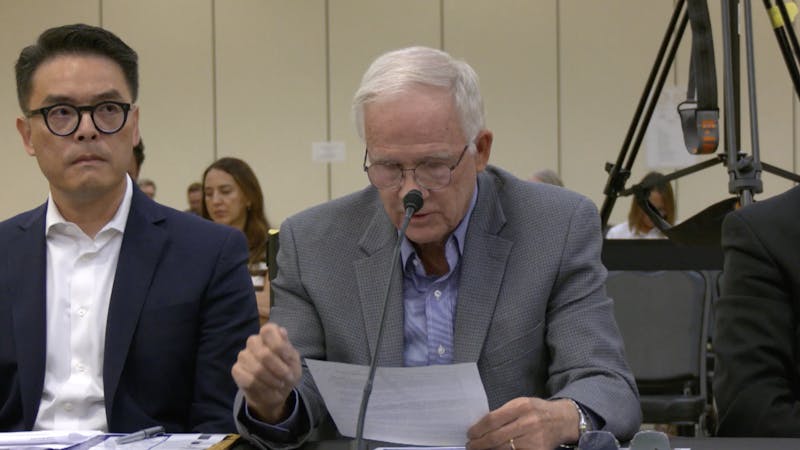Amid political uncertainty, undocumented Rice student speaks out: ‘You’re seen as no one’

When Santiago Garcia was five years old, his parents came to the United States from Colombia on a travel visa. They had come to visit their cousins in Texas, and ultimately decided to stay for the sake of their children. Though the Garcia family’s visa has since expired, they have continued living in Texas as undocumented immigrants.
Garcia, a Will Rice College freshman, said his parents gave up a comfortable life in Colombia in order to provide opportunities for him and his younger sister here in the U.S. His father is currently a construction worker and his mother used to clean banks; both held university degrees and white-collar jobs in Colombia.
“I don’t really know how other people see [undocumented immigrants] as these criminals that come here to take advantage of a system,” Garcia said. “They’re really trying to do the best they can for their family. My parents realized that Colombia could not provide to their kids what the United States could provide. They decided to literally throw everything away, make their lives hell for the next 18 years just so we could have better lives.”
Garcia said his father has held his current job for 10 years, but despite being overqualified, he is paid less than newer employees and works 10 hours a day, six days a week. He said since his parents do not speak English, he has had to shoulder extra responsibilities as a translator in their everyday lives, in addition to spending summers helping his parents out with their jobs.
“Once you come here and you’re undocumented, you’re pretty much seen as no one,” Garcia said.
Because Garcia is ineligible for federal grants and loans, his cost of attendance at Rice is covered in full by a financial aid package through the university. While he has feared deportation throughout his life for even the slightest infractions, Garcia said at Rice he feels safer.
“I’ve gotten this mentality of being very wary of the police for anything, really,” Garcia said. “That’s the way I’ve had to live here for most of my life, pretty much wary every day that something might go wrong and that my parents will be forced to leave this country. I have told a few people like my [Orientation Week] group that I’m undocumented. In Rice I can put all that behind me and just be a normal student.”
Since coming to Rice, Garcia has also had access to health insurance for the first time, so he feels more comfortable participating in sports such as freshman flag football. Previously, his family had been unable to pay for health insurance.
“I’m very much more open to doing things that are risky, because if I had ever gotten hurt before this, I would have destroyed my family’s income,” Garcia said.
Election aftermath
In the days following Donald Trump’s election victory, over 90 university presidents, including Rice President David Leebron, signed a letter addressed “to our country’s leaders” calling on the continuation of the Deferred Action for Childhood Arrivals program. DACA is an immigration policy instituted by the Obama administration in 2012 through an executive order, and it provides undocumented immigrants who entered the country as minors to apply for a renewable two-year period of deferred deportation and a work permit. Trump has called for ending DACA.
“America needs talent — and these students, who have been raised and educated in the United States, are already part of our national community,” the letter stated. “They represent what is best about America, and as scholars and leaders they are essential to the future.”
Garcia though, has tried to look past the uncertainty that a Trump presidency may hold for his DACA status.
“We can’t really let ourselves fear a lot, or spend time worrying about all this stuff because we still have to work, we still have to push through,” Garcia said. “All I can do for now on is to put some false hope into Donald Trump that maybe he was just jacking around most of the time and he’s not going to do exactly what he said he would do.”
By the night of the election, Garcia said he had “made peace” with the possibility of the outcome either way.
“When it happened, it happened,” Garcia said. “They were having a huge election watch [party] and I was just doing my homework. And it happened and I just kept on doing my homework.”
Despite his determination to move forward regardless of the election results, Garcia takes issue with rhetoric that paints undocumented immigrants as freeloaders taking advantage of the system. After all, Garcia said, his family faces daily hardships and pays taxes and he has to register for the draft, like all male American citizens.
“The majority of people who come here [as undocumented immigrants], they’re not having fun,” Garcia said. “If they could do it any other way they would. And people think that we come here, we live on welfare or something or are having the times of our lives. My dad is working 10 hours a day. They don’t come here to take advantage of anything.”
However, according to Garcia, the outpouring of support for undocumented immigrants was an unexpected result of the election.
“It surprised me because I thought the majority of people hated immigrants,” Garcia said. “Because that’s what I had seen from a lot of the events that had happened. I had never heard these voices before, and the fact that they’re all coming out now with this support, that could definitely spark an actual movement.”
Updates to Rice’s DACA policy
Two years ago, Garcia applied for DACA status, which allowed him to obtain a Social Security number, a state-issued photo ID and a driver’s permit. Nonetheless, Garcia applied to 21 universities his senior year of high school out of fear that he wouldn’t be accepted due to his undocumented status.
According to Leebron, an applicant’s undocumented status has no bearing on their admission to Rice.
“For us it does not affect their chances of admission, one way or another,” Leebron said.
In August, Rice announced that its admission and financial aid policy toward undocumented students would be expanded, effective next fall. Leebron said Rice has moved to more explicitly affirm its treatment of DACA students equally as other students in the application process, as well as taking into account that DACA students don’t qualify for federal loans or grants by replacing those with Rice scholarships. According to Leebron, these changes were made in part due to discussions with the Students of Color Collective last spring.
“We all came to a common conclusion that we should move beyond that case-by-case and ad hoc policy [toward undocumented student applicants],” Leebron said. “We decided that we would treat them the same as American students who might be immigrant or nonimmigrant.”
Furthermore, Rice’s policy will now no longer be limited to those with DACA status: Any undocumented student who has been in the U.S. for extended periods of time and graduated from a U.S. high school will be eligible.
A sanctuary campus?
Recently, a petition has circulated within the Rice community that calls for the university to declare itself a sanctuary campus. The petition, which was spearheaded by several faculty members from the English and anthropology departments, follows the heels of other universities nationwide calling for a sanctuary space designation as means to protect undocumented students.
The petition calls for a variety of measures directed at improving the livelihood of undocumented students at Rice, such as financial support, on-campus housing, mental health services, staff hires and academic freedom.
While Leebron reaffirmed his support for undocumented students at Rice in an email to the student body, he expressed some concerns with declaring Rice a sanctuary campus.
“First, Rice is subject to the law … and we should not suggest in any way that we are determined to violate applicable law,” Leebron wrote. “Second, such a designation could put our students at greater risk in two ways. It might suggest that the risks they face are reduced because of such a designation, when in fact ‘sanctuary’ status has virtually no effect on enforcement of the law. Moreover, it might make our students more of a target of enforcement efforts.”
While Garcia said he was unsure whether the petition would actually come to fruition, he appreciated the gesture.
“The most important part is the fact that they’re saying these things,” Garcia said. “They’re saying that we stand with y’all.”
More from The Rice Thresher

Rice announces Chao College as 12th residential college
Rice announced that the 12th residential college will be named Ting Tsung and Wei Fong Chao College Aug. 19. The college, set to open in fall 2026, will contain nearly 300 on-campus beds.
Dining access fund announced following on-campus unlimited meal swipes
Rice announced new food assistance programs on Tuesday to account for the controversial change in the on-campus meal swipe plan.

Rice disaster prediction model discussed at hearing on deadly Central Texas floods
The House and Senate Select Committees on Disaster Preparedness and Flooding held a hearing on July 31 in Kerrville to address the deadly July 4 flooding in Central Texas. The flooding along the banks of the Guadalupe River killed 108 people, including 37 children. In the charged hearing, Texas lawmakers and flood survivors criticized the local response to the disaster.


Please note All comments are eligible for publication by The Rice Thresher.